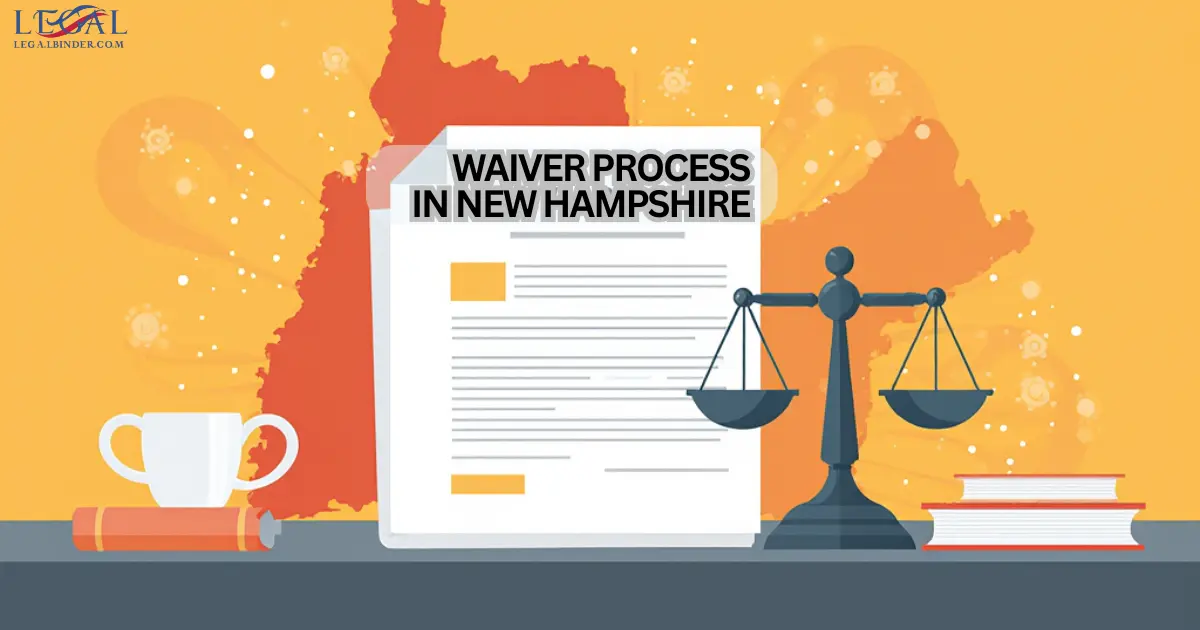This concise, state-specific waiver in New Hampshire guide walks you through filing a fee waiver in New Hampshire courts in 2025. It explains who qualifies, what documents to attach, how to complete the affidavit of indigency, and where to file—plus direct links to official New Hampshire resources.
If paying court, transcript, or appeal fees would create a hardship, follow this New Hampshire-focused process to submit a complete waiver packet and improve your chances of approval.
Quick overview — what a Waiver in New Hampshire cover
In New Hampshire, a fee waiver typically asks the court to excuse prepayment of filing fees, docketing fees, transcript charges, or other court-related costs when the filer demonstrates indigency. The request is commonly called an affidavit of indigency or a motion to proceed in forma pauperis.
Waivers can be requested in:
- District and Circuit (Superior) Courts for civil or family matters.
- New Hampshire Supreme Court for appellate in forma pauperis requests.
- Administrative proceedings where a fee is required and an agency allows waiver requests.
State-specific requirements (waiver New Hampshire)
New Hampshire judges and clerks evaluate waiver requests under state statutes and local court rules. Affidavits must be truthful, signed, and provide a clear snapshot of household income, assets, and monthly expenses.
Authoritative New Hampshire resources to consult:
Step-by-step: How to complete & submit
Follow these steps tailored to New Hampshire procedures to prepare a clean, convincing waiver request.
- Download the correct form. Get the current affidavit of indigency or in forma pauperis form from the New Hampshire Judicial Branch forms page. Use the county or appellate form depending on your filing. (courts.state.nh.us — Forms).
- Gather ID and case details. Have your government ID, case/docket number, and any notices that triggered the fee ready.
- Collect supporting evidence. Attach benefit letters (DHHS), recent pay stubs (1–3 months), bank statements, unemployment documents, and copies of unavoidable bills (rent, utilities, medical).
- Complete the affidavit accurately. List household members, monthly income sources, assets, and regular expenses. Avoid blanks and inconsistent numbers; the court relies on clear arithmetic.
- Sign under oath. The affidavit must be sworn. Notarize if required or swear before a clerk when filing in person.
- Attach exhibits and a cover index. Staple documentary proof and include a one-page attachment index so the judge can quickly verify evidence.
- File with the proper clerk. Submit to the county clerk (or appellate clerk for appeals) in person, by mail, or via e-filing where available. Ask for a filed-stamped copy.
- Attend any hearing. If the judge schedules a hearing, bring originals and be prepared to explain your financial hardship succinctly.
Common documents New Hampshire courts request with a waiver:
- Affidavit of Indigency / Motion to Proceed In Forma Pauperis (NH Judicial Branch or county form).
- Proof of public benefits (DHHS letters showing Medicaid or SNAP).
- Recent pay stubs, employer statements, or unemployment benefit letters.
- Bank statements for the last 1–3 months.
- Receipts or bills for rent/mortgage, utilities, medical treatment, or childcare expenses.
- Any court or appeal paperwork related to the fee being waived.
Processing time, fees and deadlines Waiver in New Hampshire
Filing a waiver request is usually free. Timeframes and deadlines depend on the court and case type.
- Processing time: Decisions commonly range from several days to a few weeks. If a hearing is needed, add scheduling time.
- Fees: No fee is required to submit the waiver; if denied, the filer must pay the applicable fee to proceed.
- Deadlines: File the waiver early—ideally with your initial filing or before an appellate filing deadline—to avoid forfeiting rights.
Common mistakes to avoid Waiver in New Hampshire
- Using any form not current or not issued by the NH Judicial Branch.
- Failing to attach documentary proof of benefits or income.
- Leaving income, asset, or expense fields blank or inconsistent.
- Filing with the wrong court or missing appellate timing rules.
- Not obtaining and keeping a filed-stamped copy of the waiver packet.
Download forms and verify benefits at these authoritative sites:
FAQs
Q: Is receiving DHHS benefits enough to guarantee a waiver in New Hampshire?
A: DHHS benefits are persuasive evidence but not automatic. The court reviews total household resources and expenses.
Q: Can inmates file for fee waivers in New Hampshire?
A: Yes. Incarcerated persons may file in forma pauperis motions and should follow jail-mail procedures or ask facility staff for assistance with filings.
Q: What happens if my waiver is denied?
A: You will need to pay the required fees to proceed. Contact local legal aid or UNH Law clinics for help if you cannot afford payment.
Q: Can I appeal a denial of a fee waiver?
A: Procedures vary by court level. For appellate matters, consult the NH Supreme Court rules and consider filing an expedited motion or seeking counsel promptly.
A: County clerks provide general filing information; UNH Law clinical programs and local legal aid organizations offer limited assistance or referrals.
Conclusion & call to action
Use this New Hampshire waiver checklist to submit a complete, well-documented packet: download the current affidavit from the New Hampshire Judicial Branch, attach DHHS benefit letters and recent pay stubs, sign under oath, and file with the appropriate clerk promptly.
For official forms and county-specific filing guidance visit courts.state.nh.us and verify benefits at dhhs.nh.gov. For help, check UNH Franklin Pierce School of Law clinics at law.unh.edu or see related resources on USAlegalBinder.com. Always confirm requirements with official New Hampshire government pages or consult a licensed attorney for case-specific advice.
